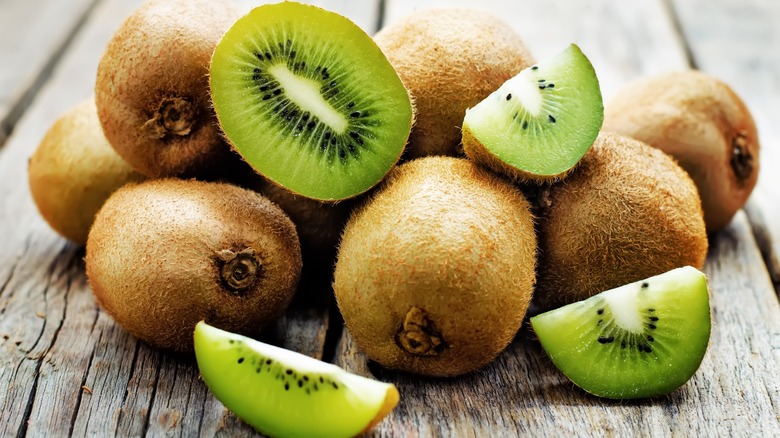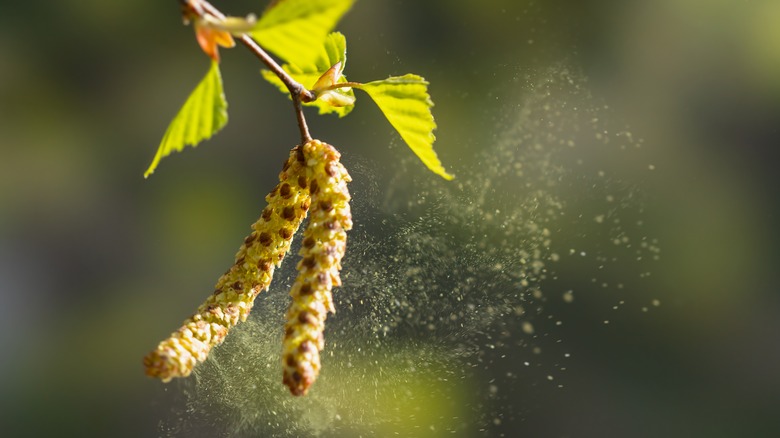Mouth Feel Tingly After Eating Kiwis? Here's What's Happening
Have you ever taken a bite out of a fresh kiwi and noticed that your mouth starts to tingle? Not in a "wow, this is delicious" way, but in a "this burns and is unpleasant" way. While you'd be correct to say this could be an allergic reaction, the kiwi itself may not be the culprit. What you may be experiencing is Oral Allergy Syndrome.
Oral Allergy Syndrome, which is also called Pollen Food Allergy Syndrome, is an allergic reaction to fresh fruits that are similar to plant pollen. Pollen allergies often results in sneezing and runny noses, but Oral Allergy Syndrome reactions are essentially the internal version of that, hence itchiness or swelling in the mouth. If you have plant allergies, it's likely that you can have fruit allergies as well, especially a kiwi allergy. This is because, as it turns out, kiwi ranks among the top 10 food allergens in many parts of the world.
This syndrome can occur with multiple fruits and vegetables, so it's important to be mindful of how your mouth feels while eating different things — not just kiwis. But thankfully, there are ways to combat this uncomfortable tingling sensation, so you can still eat all your favorite fruits.
A deep dive into Oral Allergy Syndrome
Oral Allergy Syndrome is one of the ways our bodies let us know when certain foods don't get along with us. The full scientific breakdown explains how the tingling in our mouth that occurs when we eat fruits like kiwi is our body reacting to the proteins within the fruit that are similar to pollens we're also allergic to. For kiwis specifically, the proteins that cause the tingling are similar to allergic reactions triggered by grass and birch tree pollen. So, if you've noticed that kiwis make your mouth itch, you may have also noticed some sneezing in the early months of the year.
Kiwi is not the only fruit that causes Oral Allergy Syndrome. In fact, other foods, like apples, peaches, carrots, and even some nuts, are associated with the birch tree allergy that can all cause Oral Allergy Syndrome. This doesn't guarantee that you'll be allergic to anything related to this particular protein, but it can help you be conscious of certain food groups. Other fruits that are commonly associated with Oral Allergy Syndrome include cantaloupe, banana, watermelon, and honeydew.
Remember that having Oral Allergy Syndrome is not the same as being allergic to the fruit itself. Those with more serious kiwi allergies will experience more severe symptoms than mouth itching, such as tongue and throat swelling, mouth numbness, and, in some cases, anaphylaxis.
How to mitigate the effects of Oral Allergy Syndrome
Since Oral Allergy Syndrome is tied to proteins and is a broader allergy, it can be combated in a lot of ways. The first step is to know which fruits match your pollen allergies, especially if you don't eat certain fruits as often. Allergy medicines are an easy quick solution if you start experiencing symptoms. You can take them ahead of time.
When it comes to the fruits themselves, you can cook them, as the proteins cook out at high temperatures. With kiwis, this may not work as well, given there aren't many baked kiwi dishes. But if you're allergic to other fruits, like peaches, you can curb your allergies by making an old-fashioned peach cobbler for example. You could also heat your fruit on the grill to cook out proteins and make fruit skewers with a spicy maple-cumin glaze.
Another thing that helps prevent Oral Allergy Syndrome is peeling the skin off your fruit, since that is where the majority of the protein is contained. It may not solve the problem entirely, but it will allow you to enjoy the fruit with fewer concerns. A glass cup is all you need to peel a kiwi, so enjoying this fruit at home is as easy as can be.


